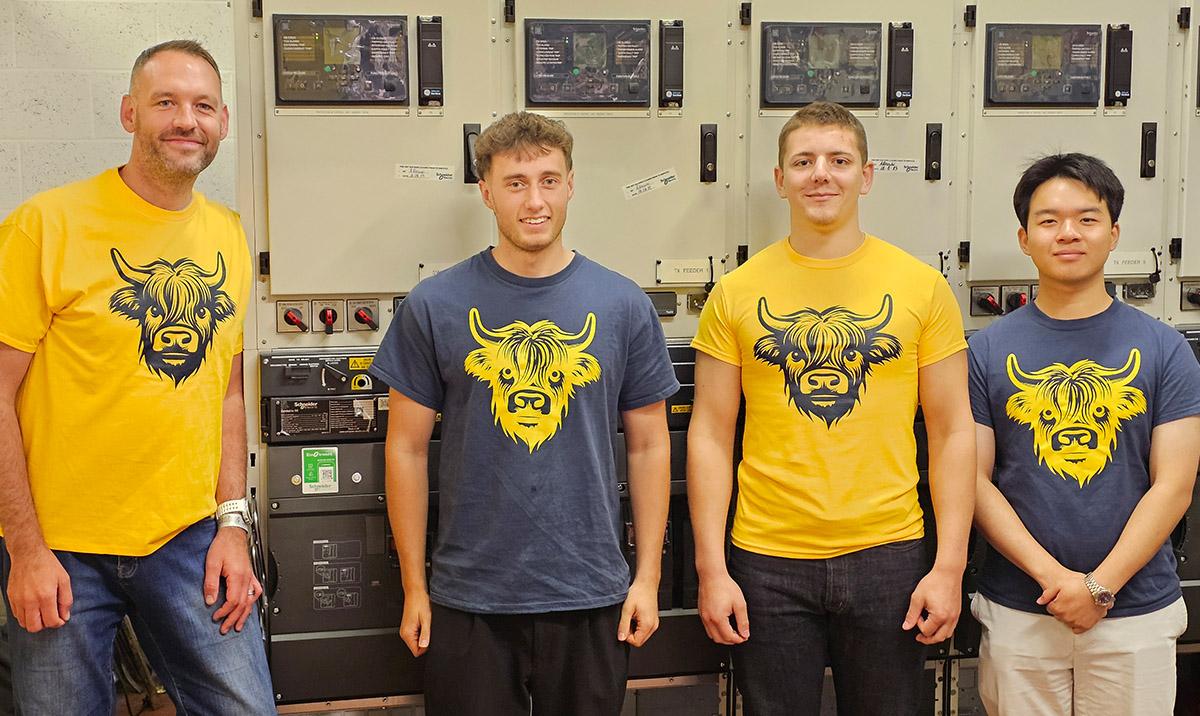Fostering early-career development
23 October 2025
Christopher Lo and Jack Scott, Electrical and Mechanical Engineering students at the University of Edinburgh, look back on their 12-week placement with us at the Advanced Computing Facility.

Above (left to right): Paul Clark (EPCC Director of HPC Systems), James Walter, Jack Scott and Christopher Lo.
EPCC’s Advanced Computing Facility (ACF) is a 38MW data centre comprising four computer rooms and their associated plant rooms, which provide dedicated power and cooling infrastructure. The ACF undergoes continuous maintenance and updating. This summer, for example, we were completing the first phase of major refurbishment works in Computer Room 2, undertaking mechanical and electrical works to support the next iteration of the Cirrus service, and undertaking a major project to replace much of our high voltage switchgear.
The systems hosted at the ACF are used for research across the UK, but we are also keen to use the ACF itself as a subject of study and are particularly interested in developing a digital twin of it.
Working at the ACF is therefore a valuable learning opportunity for mechanical and electrical engineering students, and for the first time last summer we participated in the University of Edinburgh’s Employ.ed on Campus scheme to offer 12-week summer internships to three students from the University’s School of Engineering.
This was a great success, with all the participants giving positive feedback on their time at the ACF and, on EPCC’s side, improving the documentation and reporting on our mechanical and electrical systems. As a result, this summer we were delighted to be joined by Christopher Lo and Jack Scott, two new interns from the School of Engineering, and also to welcome back James Walter for a six-month industry placement with us after his Employ.ed internship last year. Below, Christopher and Jack talk about their time with us at EPCC.
Christopher Lo
My time here has provided invaluable experience of computing systems and data centre architecture, and also insight into the support systems behind the UK’s first National Supercomputing Centre.
My work has focused on documentation of the site in preparation for the next stage of UK supercomputing. Initially the site was a bit overwhelming, understanding the systems and electrical and mechanical infrastructure was a massive challenge. However, through interactions with on-site staff members, I have gained a good understanding of the site's operations, which allowed me to contribute more significantly to ACF projects.
The most significant project is the creation of the ACF digital twin, which will be used to simulate energy usage and ultimately optimise the facility. My main contributions have been documenting the site’s core electrical and mechanical systems in NetBox, a data centre infrastructure management (DCIM) tool. Additionally, a key task involved verifying and documenting sensors as well as their readings into a new centralised database that my fellow interns and I designed!
Working at the ACF has increased my appreciation for the engineering and support systems behind supercomputing, which are paving the way for the next era of human information technology. This is an innovative and exciting industry that is growing exponentially, and I am extremely grateful to have been a part of the EPCC HPC systems team.
Jack Scott
My electrical engineering internship at EPCC provided hands-on experience with energy monitoring systems at the Advanced Computing Facility. Working on infrastructure supporting ARCHER2 and systems including EIDF, Tursa, and Somerville, I tackled the complex challenge of developing accurate energy attribution for fair billing of research projects using the facility's computing resources.
The core technical work involved physically networking in-rack power distribution units (PDUs) throughout the facility. This required configuring dozens of intelligent PDUs from manufacturers Raritan and HPE using serial communication cables to establish network connections. Each PDU needed individual configuration to enable automatic data collection, creating a comprehensive monitoring network across the facility's critical infrastructure.
I designed and implemented a unified data structure for storing PDU metrics in Graphite, a time-series database system. This hierarchical organisation accommodated multiple PDU types whilst ensuring consistent query performance and scalable data management. The structure supports system-level energy billing by organising data according to room, system, cabinet, and circuit hierarchies, enabling precise attribution of energy costs to specific research projects.
Power hierarchy mapping proved essential for understanding electricity flow from the main 11 kV supply through transformers and distribution systems to individual computing components. When my initial comprehensive database solution wasn't adopted due to maintenance concerns, I adapted by creating Python scripts to integrate with the facility's preferred monitoring platform - a valuable lesson in balancing technical optimisation with operational constraints.
This experience developed my skills in industrial-scale systems integration, network configuration, and data analysis whilst working with live electrical systems in a mission-critical environment. The work directly impacts UK researchers conducting climate science and medical research, as accurate energy billing enables better resource allocation for critical scientific computing projects.
I had a great time working at the ACF and I would like to thank everyone there for their support and guidance throughout my internship. I would especially like to thank my supervisor, Zoë Payne, for her mentorship and encouragement during my time at EPCC. And also my fellow interns, James and Christopher, for their invaluable help and camaraderie throughout. One more thank you to Paul Clark and everyone at EPCC for making this internship possible.
